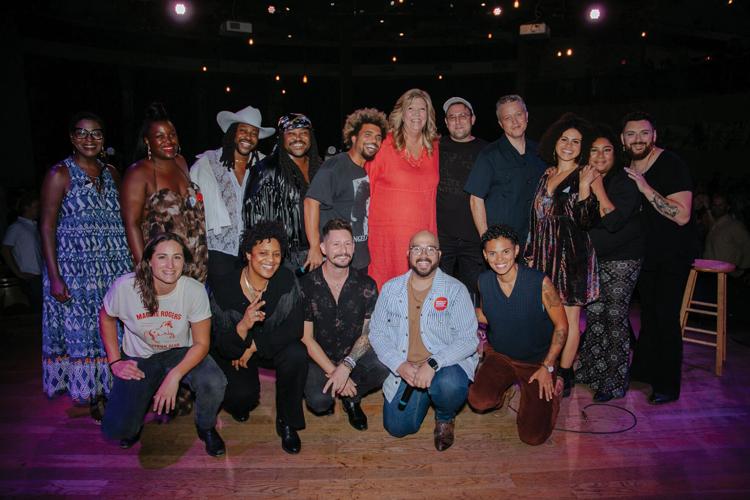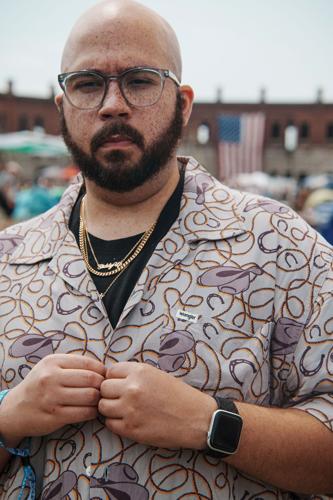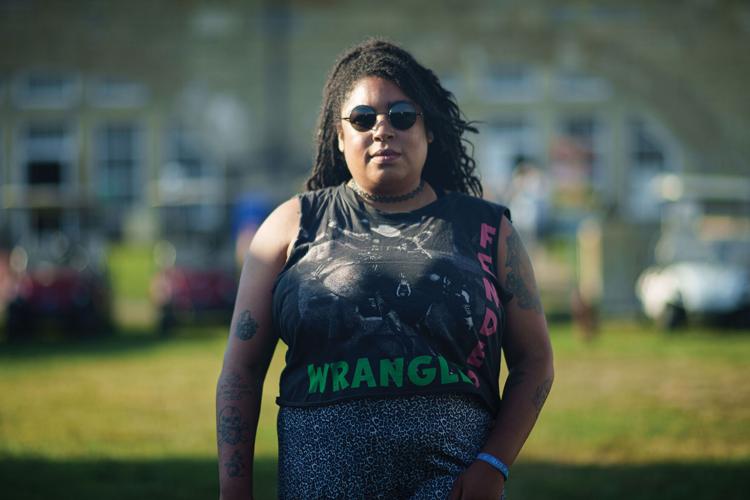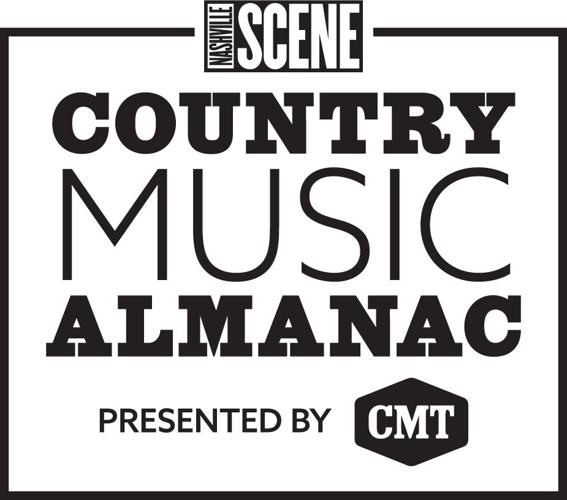
Black Opry at the Together in Action show
If you can’t find what you’re looking for, you may just have to make it. Black Opry has taken that principle to heart since Holly G launched the collective in early 2021 with the intent of creating platforms for Black artists in country music and Americana. During AmericanaFest that year, the organization made headlines by hosting a space for Black artists and allies to gather at The Black Opry House. The collective has grown rapidly since, hosting Black Opry Revue shows at clubs and festivals far and wide, organizing or co-organizing expansive benefit shows, working with Philadelphia’s NPR music station WXPN to host a Black Opry residency and more.
In the fall, Holly G and co-director Tanner Davenport announced their next venture: Black Opry Records, an imprint backed by label and artist services juggernaut Thirty Tigers, set to make its debut this summer. Fueled by energy drinks, the pair took a break from their busy schedules to tell the Scene what to expect from the label this year.

Holly G
What would you like people to know about Black Opry Records?
Holly G: As far asmy research goes — I don’t want to make an absolute statement because so much history gets lost — I cannot find another Black-owned or queer-owned label that specifically caters to country music, much less Black [country] a rtists. So we get to be — I don’t want to say the first — the first in people’s consciousness, which is really, really important to me. We have signed the first artist, and we’ve already wrapped up the record. We’re super excited to announce that sometime this summer.
It’s some of my favorite music that I’ve heard. It’s really fucking cool to not only be a part of country music, but to be a part of making it in the way that I wish that it existed in the mainstream. Having the support of Thirty Tigers really gives these artists an opportunity to compete with — maybe not mainstream, but some of the more midlevel artists in this space, which is something that we have not been able to do on our own, because everything comes down to resources. Having the backing from the machine that is Thirty Tigers allows us to do that.
Where did the idea to start a label come from?
HG: I was at a space last year where I realized we had to figure out the next branch of Black Opry. I didn’t really know what that was. I ended up talking with [Thirty Tigers president] David Macias. He had reached out to me just to chat. We discussed my passion for artist development, and he said, “Well, you can either do artist management, or you can start a record label.” As soon as I heard “artist management” I almost kicked him out of my house because I hate managing artists. I tried it. I didn’t like it. I was really bad at it. So we started talking about labels. Honestly, all it took was one conversation.
It seems like “record label” is a nebulous concept these days. Thirty Tigers is not a record label, but they do a lot of things a label traditionally does. What will this partnership offer to artists?
HG: Any artist that you see signed to Thirty Tigers has to set up their own record label, like an imprint. The biggest advantage that we have right now is the power of the Black Opry brand. I’m by no means under any delusion that we’re a major brand, but we have created a lot of goodwill with the press and the industry. The name opens up doors.
Our focus is on developing artists. We’re leaning toward artists that don’t have a team, might not know the business as well. Artists that are really, really talented and maybe don’t know how to — or want to — handle the business side of their career and need help with that. We have the opportunity to redefine what it looks like to work with a record label and do it in a way that is more artist-forward and artist-friendly. Thirty Tigers has been at the forefront of that, and we want to continue that legacy and make it something that works for Black artists that consider themselves country, whatever that means to them.

Tanner Davenport
Once you hear this first record, I think it’ll really articulate what it means to be free within the genre. It all sounds country, but it’s also rock and pop and just saying, like, “Hey, we see you as a country artist.”
Tanner Davenport: We want to give them the freedom to let them do their interpretation of what country means to them. The music is insane.
HG: If you look at the way that the mainstream genre operates, there are not the same restrictions for white artists. If you look at the success of Florida Georgia Line and Sam Hunt — and more recently, Jelly Roll and Ernest — these artists are not making straightforward country music. We want Black artists to have the opportunity to do the same without being shut out.
Both of you have entered the music industry relatively recently. What has the learning curve been like?
HG: I’m really good at saying no. I think the label was a really good exercise in learning when to say yes — even when you don’t know what that looks like, or what that means. I can’t imagine having missed out on what we’re creating if I had said no to that opportunity just because I thought it was something that I wasn’t interested in.
TD: I’ve been doing some artist management myself [in addition to Black Opry] since June. My biggest learning curve is accepting and understanding that truly nobody knows what they are doing. I’ve learned to be OK with that, because I’ve always been someone who prepared instead of jumping into something. Holly G saw something within me that immediately pulled me into this. It allowed me to believe I could make a career in music. Six months ago, I was selling iPhones at Green Hills mall — like, dreading every second of the day because I knew that’s not what I was intended to do. Now I’m just more open to opportunities and open to what’s going to be brought my way.
What are you most excited for with the label?
TD: Recently we’ve paid less attention to mainstream country. We know the same awful things that are going on in the industry where no Black artists are getting showcased, no Black artists on the radio. We understand that is an ongoing thing, but we’ve not made that our sole focus because we’re creating something outside of it that’s going to be so much bigger than what’s happening. … The mainstream and the industry itself will have no other choice but to look in our direction. This will show that Black Opry is not a fad. We’re here to make long-term impact in the industry. And these records, I think, are going to be mile markers of how far we’ve gotten.
HG: I’m fucking excited to have such a running start, being able to really have an impact on what country music looks like. I’m not naive enough to think that the mainstream country music industry will change, but I think that we are really on a good pace to build something new and something different. I don’t want to say “an alternative to,” but definitely something that’s competitive with what the mainstream is doing. You can’t meaningfully infiltrate a system that was built to work against you, but you can work outside of it and build something new and build something better.

Taking a look at the state of country music now and in the year ahead with Brothers Osborne, Black Opry, Abby Anderson and more















